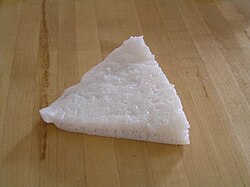This article needs additional citations for verification. (February 2013) |
White sugar sponge cake (also called white sugar cake and white sugar pastry) is a type of Chinese pastry.
 | |
| Alternative names | White sugar cake, white sugar pastry |
|---|---|
| Type | Cake |
| Place of origin | Foshan, China |
| Main ingredients | Rice flour, sugar, water, leavening agent |
| Variations | Bánh bò |
| Similar dishes | Htanthi mont, Fa gao, Bánh bò, Sanna |
| White sugar sponge cake | |||||||||||||||||||
|---|---|---|---|---|---|---|---|---|---|---|---|---|---|---|---|---|---|---|---|
| Chinese | 白糖糕 | ||||||||||||||||||
| Hanyu Pinyin | bái táng gāo | ||||||||||||||||||
| Jyutping | baak6 tong4 gou1 | ||||||||||||||||||
| Literal meaning | white sugar cake | ||||||||||||||||||
| |||||||||||||||||||
It is made from rice flour, white sugar, water, and a leavening agent.[1][2]
While it is called a "cake", it is not served as a circular round cake. It is usually purchased as an individual square piece or a mini triangle. The cake is white in color, with a spongy and soft consistency. The taste is sweet, and sometimes has a slightly sour taste due to fermentation of the batter prior to cooking. Like most Chinese cakes, it is steamed, giving it a moist, soft, and fluffy texture, as opposed to a dry and firm one.[3] If left exposed to the air, it hardens quickly. It is usually kept under some cover to preserve moistness. It is typically served hot, because when it is cold it is not as soft and moist. The batter is either poured over a bowl in a steamer, a Chinese steamer cloth or aluminum foil. If made from brown rice flour and brown sugar it is called a brown sugar sponge cake.
A Vietnamese version of the cake, called bánh bò, differs from the Chinese version in that it often uses coconut milk as an ingredient,[4] and does not have the sourness that often typifies the Chinese version.
Names edit
The cake has a variety of regional names, including:
- Baak Tong Gou (Cantonese)
- Bai Tang Gao (Mandarin)
- Pak Thong Koh (Malay)
- Puting Asukal Bibingka (Filipino)
See also edit
References edit
- ^ Shimabukuro, Bitty (2003-05-21). "Rice cake revelation". Honolulu Star-Bulletin. Retrieved 2011-06-28.
- ^ 梅联华 (2008). 南昌民俗 (in Chinese). 江西人民出版社. ISBN 9787210038184.
- ^ "鏞融芯語——粵菜別名大起底". 頭條日報 Headline Daily (in Chinese). Retrieved 2019-06-10.
- ^ "We're sweet on these Vietnamese desserts". SBS Food. Retrieved 2019-06-10.